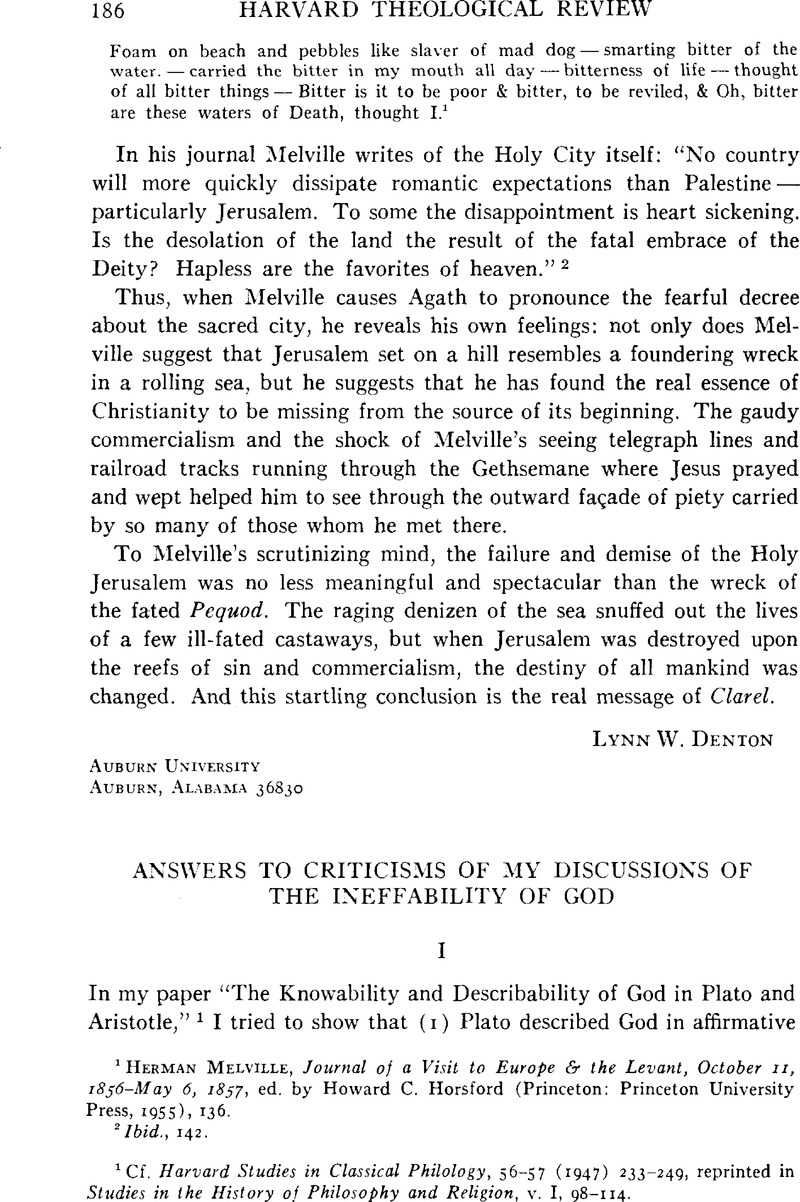Published online by Cambridge University Press: 10 June 2011

1 Cf. Harvard Studies in Classical Philology, 56–57 (1947) 233–249Google Scholar, reprinted in Studies in the History of Philosophy and Religion, v. I, 98–114.
2 Studies, I, pp. 103–104.
3 Philo, II, pp. 94–126.
4 Ibid., pp. 149–160.
5 Ibid., pp. 111–118.
6 Revue des Etudes Anciennes 60 (1958) 446–448Google Scholar, quoted with evident approval by Feldman, Louis H. in his “Scholarship on Philo and Josephus,” Studies in Judaism (1937–1962), Yeshiva UniversityGoogle Scholar.
7 “Basilides on the Ineffability of God,” Harvard Theological Review 62 (1969) 368, n. 4Google Scholar.
8 Journal of Theological Studies 49 (1948) 211Google Scholar.
9 Cf. my discussion in The Philosophy of the Church Fathers, I, pp. 85–86, and nn. 89–94, of attempts to identify Aristotle's God with his fifth element in passages quoted in the names of Athenagores, Clement of Alexandria, the Recognitiones of Clement of Rome, and Lactantius.
10 Classical Review 63 (1949) 24–25CrossRefGoogle Scholar.
11 In the same passage, Cicero refers to Plato's “books of the Laws” where Plato is quoted by him as saying “that no inquiry at all ought to be made into what God is.” The reference is to the opening words of a discussion in Laws VII, 821 A, where, however, in the course of the discussion it is made clear that the nature of God is a fit and possible subject of inquiry. Cf. also Laws XII, 966C and Cicero's own subsequent comments in the same passage in De Natura Deorum III on Plato's treatment of God in his Timaeus and Laws.
12 This explanation may apply also to Seneca's description of God as having no name referred to in my Philo, II, p. 113 at n. 25. Cf. also my discussion in Philo, II, pp. 115–116, of the expression “the unknown God” in Acts 17:23.
13 Cf. above at n. 2. Chadwick quotes also a passage from Philo's De Gigantibus 8 against my view that Philo denied the existence of souls in the spheres (op. cit., p. 25, Col. 1). I myself have quoted that passage from De Gigantibus and explained it (cf. Philo I, p. 364). Evidently Chadwick does not agree with my explanation.
14 Op. and loc. cit. above n. 7.
15 Ibid.
16 Cf. Studies, I, pp. 371–401.
17 Ibid., pp. 387–389 and 140–141.
18 Ibid., pp. 131–142.
19 Op. cit. (above n. 6), p. 370, at n. 9.
20 Ibid., at nn. 10–15.
21 Cf. Indexes of their respective works.